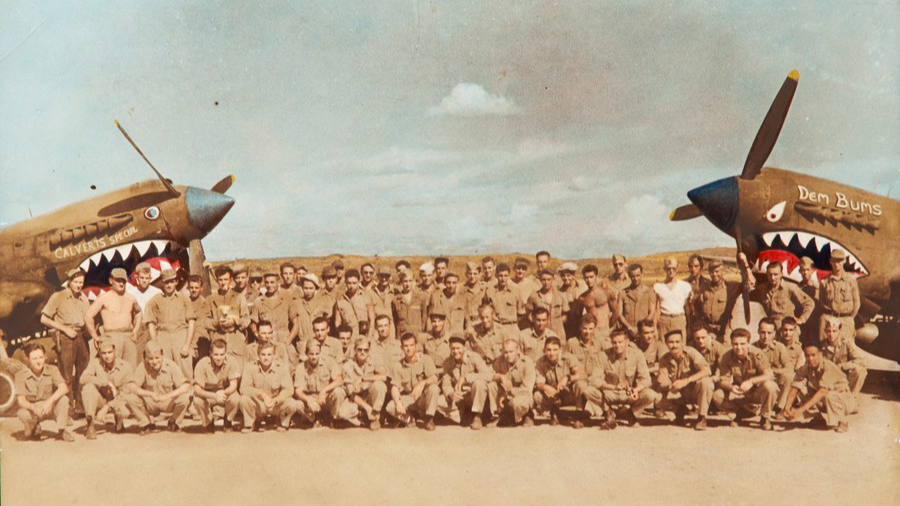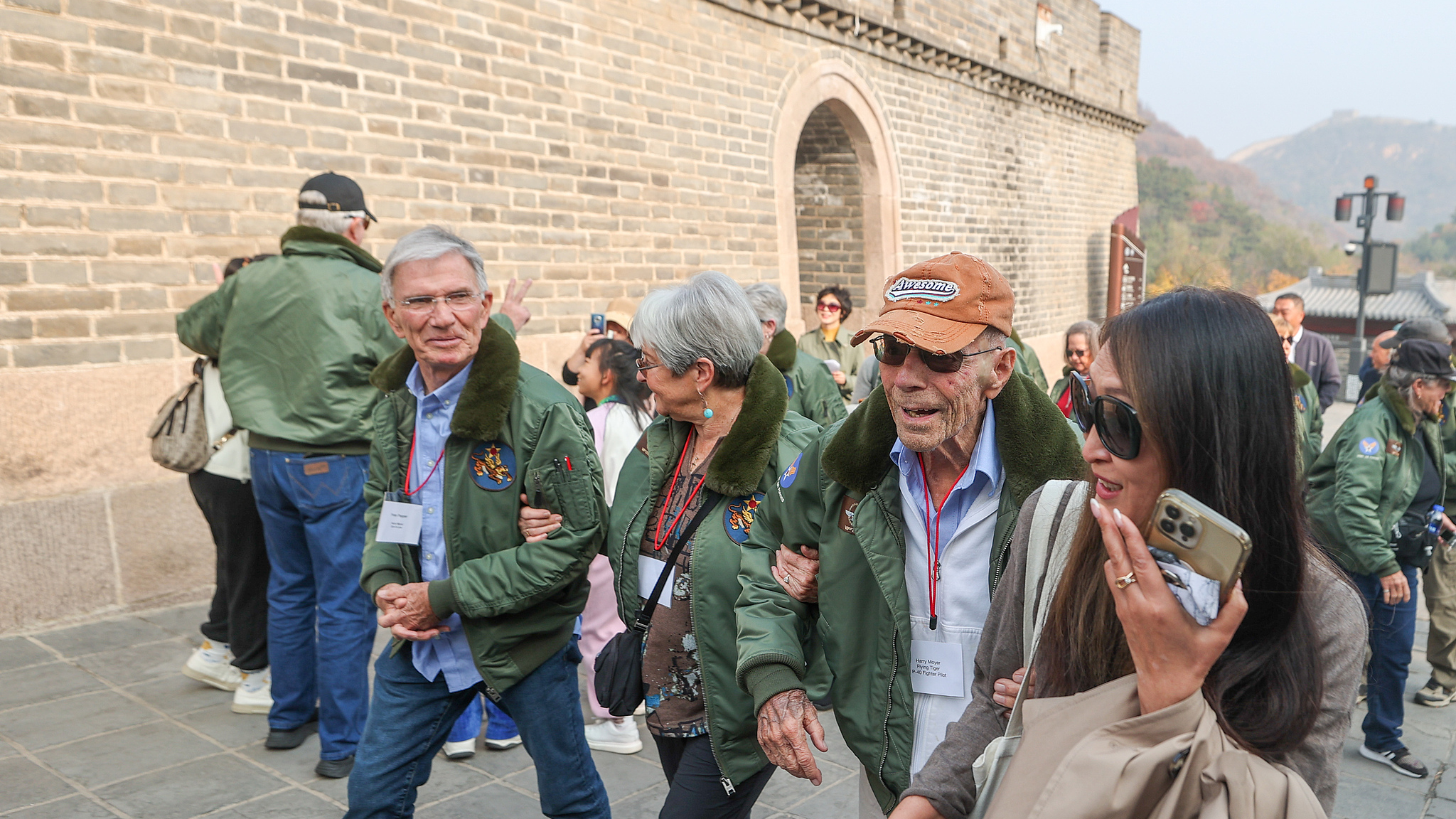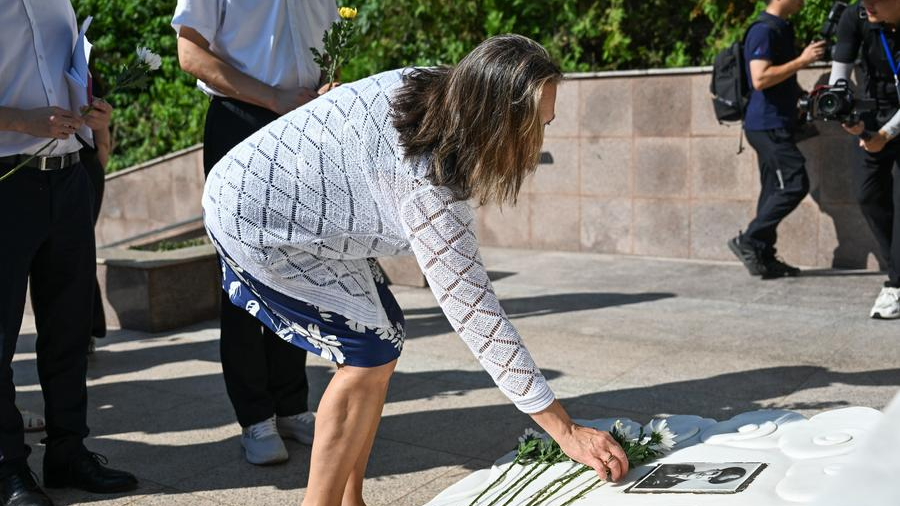China is set to hold a grand military parade next month in Beijing, marking the 80th anniversary of the victory in the Chinese People's War of Resistance Against Japanese Aggression (1931- 1945) and the World Anti-Fascist War.
In addition to showcasing advanced armaments, the presence of international guests at the parade highlights the contributions of those who supported China's victory, underscoring the enduring spirit of mutual assistance during times of hardship.
Among the honored foreign guests are members of the American Flying Tigers and their families. The Flying Tigers, officially known as the American Volunteer Group of the Chinese Air Force, were formed in 1941 by U.S. General Claire Lee Chennault to assist China in its battle against Japanese invaders.

Members of the 76th Squadron of the 23rd Fighter Group of the 14th U.S. Air Force, in which Flying Tiger pilot Glen Beneda served as a pilot, pose for photos in front of two shark-teeth fighter planes in China during World War II. /Xinhua
Their legacy
"We were acutely aware of the horrific atrocities committed by the Japanese invaders against the Chinese people," recalled Harry Moyer, a Flying Tigers veteran, in an interview with China Media Group (CMG). "We felt compelled to help."
The Flying Tigers shot down nine Japanese aircraft shortly after arriving in China in December 1941, achieving the first significant defeat for Japanese forces since their air raids began on southwest China's Kunming City.
The Flying Tigers faced even greater challenges in 1942 when Japanese forces occupied Myanmar, severing China's last international supply route. To overcome this blockade, the Chinese and American air forces pioneered the dangerous "Hump Route" – an airlift over Mount Qomolangma that connected India to Kunming, delivering vital international aid and supplies.
The route's unpredictable weather and constant threat of interception by Japanese aircraft made it one of the most perilous and deadly air passages in the world at that time. On average, one aircraft was lost every two days.
From 1941 to 1945, the Flying Tigers, in collaboration with Chinese military and civilians, shot down or destroyed approximately 2,600 Japanese aircraft. Over 2,000 Flying Tigers members gave their lives in combat, according to the Memorial Hall of Nanjing Anti-Japanese Aviation Martyrs.
Beyond the intense combat, there were also moments of deep humanity. Glen Beneda, whose plane was hit and crashed into a lake, was rescued by Chinese farmers and soldiers who transferred him to a military base. Severely wounded and barely able to move, he formed lasting friendships with the Chinese soldiers during his recovery, even playing ping pong with them.

The Flying Tigers veterans at the Badaling section of the Great Wall in Beijing, October 29, 2023. /VCG
Remembering along the way
In his 1949 memoir "Way of a Fighter," General Chennault wrote, "It is my fondest hope that the sign of the Flying Tiger remains aloft as long as it is needed, and that it will always be remembered on both shores of the Pacific as the symbol of two great peoples working toward a common goal in war and peace."
Chennault's hope was not in vain.
"The Chinese people never forget the Flying Tigers. We built a Flying Tigers museum in Chongqing and invited over 1,000 veterans and their families to visit China. I have kept in touch with some of them through letters," said Chinese President Xi Jinping at a welcome dinner hosted by Friendly Organizations in the U.S. in November 2023.
The kindness of the Chinese people was also remembered by the Flying Tigers. Jeffrey Greene, chairman of the Sino-American Aviation Heritage Foundation, said that many Flying Tigers pilots have told him that, despite the passing decades, they have never forgotten the taste of Chinese eggs.
At a time when the Chinese people themselves had little to eat, mothers would offer their precious eggs to American pilots to give them the strength to continue the fight against Japan. This gesture of warmth remains deeply etched in the memories of Flying Tigers veterans, Greene said.
Founded in 1998 by Greene and several Flying Tigers veterans, the Sino-American Aviation Heritage Foundation aims to preserve and promote the shared history of U.S.-China wartime cooperation. Over the years, the foundation has sponsored around 500 veterans and hundreds of their families and descendants to visit China.

Anna Li, daughter of a Flying Tiger veteran, lays a flower on the tombstone of U.S. Flying Tiger pilot Glen Beneda in Hong'an County of Huanggang City, central China's Hubei Province, July 28, 2025. /Xinhua
Nourishing a lasting bond
In a 2023 reply letter to Greene and Flying Tigers veterans Moyer and Mel McMullen, Xi praised the foundation and veterans' efforts to promote the Flying Tigers' story in both China and the U.S. He expressed his hope that the spirit of the Flying Tigers would be passed down to the next generation, strengthening the bond between the people of the two nations.
Greene, who led a youth delegation to central China in late July, encouraged the young visitors to share their experiences with others, particularly what they had learned during their visit to Beneda's tombstone. Calling the youth "part of the Flying Tigers story," Greene emphasized that their actions contribute to the ongoing relationship between China and the U.S.
Acknowledging that fewer Flying Tigers veterans remain, Greene reaffirmed the foundation's commitment to fostering mutual understanding between the youth of both countries, ensuring the Flying Tigers' spirit thrives in a new era.
At the opening ceremony of the China-U.S. Flying Tigers Friendship and Cooperation Forum on July 21, Chinese Ambassador to the U.S. Xie Feng said the spirit of the Flying Tigers embodies the courage and commitment of China and the United States to safeguard peace, the profound friendship forged between the two countries in fighting side by side and genuine expectations for carrying forward the goodwill.
It is hoped that there will be more Flying Tigers of the new generation in both countries, who will commit themselves to promoting the friendship between the two peoples and advance the stable, sound and sustainable development of China-U.S. relations, Xie added.
阅读原文;https://news.cgtn.com/news/2025-08-20/Flying-Tigers-legacy-celebrated-to-nourish-a-lasting-bond-1FZNFsPy6Dm/p.html